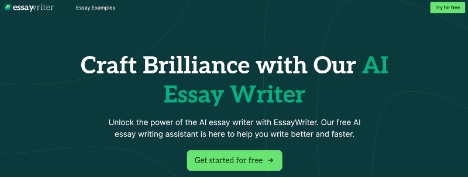In recent years, artificial intelligence (AI) has made significant strides in various industries, and the realm of writing is no exception. With the advent of AI essay writing, writers now have access to powerful tools and assistants that can streamline the writing process, enhance creativity, and improve overall productivity. In this blog, we'll explore the evolution of AI essay writing, its impact on writers, and the potential implications for the future of writing.
The Evolution of AI Essay Writing:
AI essay writing has its roots in natural language processing (NLP) and machine learning technologies. Early iterations of AI writing tools focused primarily on grammar checking and basic language correction. However, advancements in AI algorithms and deep learning techniques have paved the way for more sophisticated applications, including content generation, style analysis, and even plagiarism detection.
How AI Essay Writing Works:
At the heart of AI essay writing lies powerful algorithms that analyze vast amounts of text data to understand language patterns, semantics, and context. By leveraging this knowledge, AI writing tools can generate coherent and contextually relevant content on a wide range of topics. These tools often utilize neural networks and language models trained on large corpora of text to generate human-like writing that mimics the style and tone of a human author.
Benefits of AI Essay Writing:
-
Enhanced Productivity: AI writing tools can automate repetitive tasks, such as research, outlining, and formatting, allowing writers to focus their time and energy on higher-level eassy writing tasks, such as generating ideas and refining arguments.
-
Improved Quality: With AI-powered grammar checking, style analysis, and content generation capabilities, writers can produce higher-quality writing that is more polished and refined.
-
Increased Creativity: AI writing tools can inspire creativity by generating novel ideas, suggesting alternative phrasing, and providing prompts for exploration.
-
Efficient Collaboration: AI writing tools with collaborative features enable multiple users to work together on writing projects in real-time, facilitating seamless collaboration and communication.
Challenges and Considerations:
While AI essay writing holds immense promise, it also presents certain challenges and considerations. These include:
-
Ethical Concerns: The use of AI writing tools raises ethical questions related to authorship, plagiarism, and intellectual property rights.
-
Bias and Fairness: AI algorithms may exhibit biases inherent in the data they are trained on, leading to biased or unfair outcomes in writing.
-
Human Oversight: AI writing tools are not infallible and may produce errors or inaccuracies that require human oversight and intervention.
The Future of Writing with AI:
As AI essay writing continues to evolve, it is likely to become an integral part of the writing process for writers across various disciplines and industries. With ongoing advancements in AI technology, we can expect to see even more sophisticated AI writing tools that offer greater customization, personalization, and integration with existing writing workflows.
In conclusion, AI essay writing represents a paradigm shift in the way we approach writing, offering unprecedented opportunities to enhance creativity, efficiency, and quality. While challenges and considerations remain, the potential benefits of AI writing tools are undeniable, paving the way for a future where writers can leverage AI to unlock new levels of productivity and innovation.


No comments yet